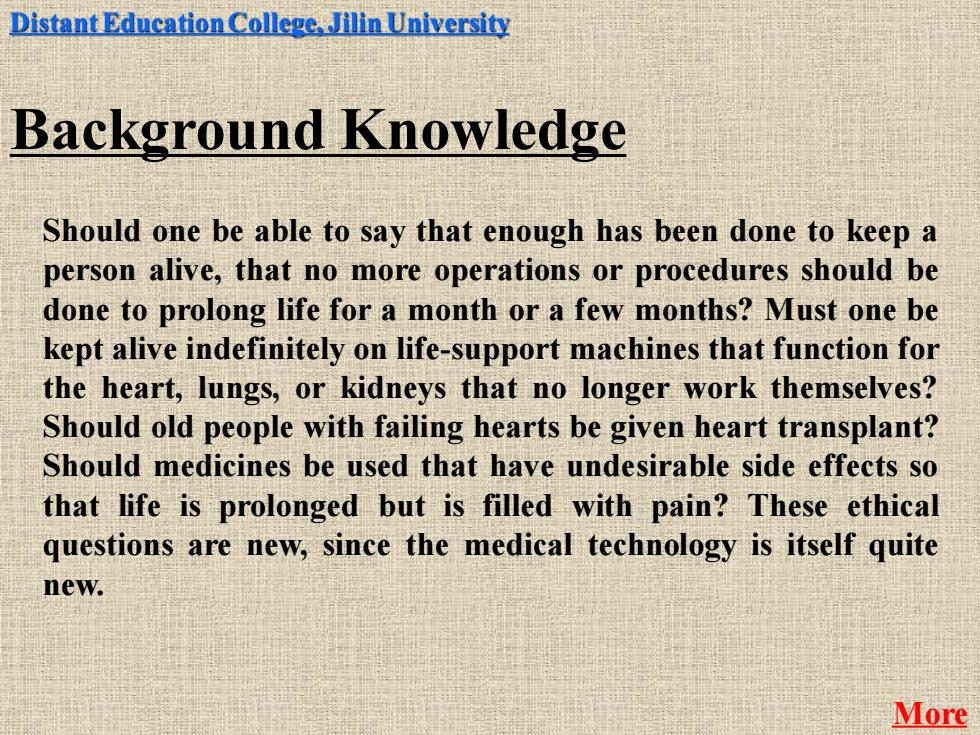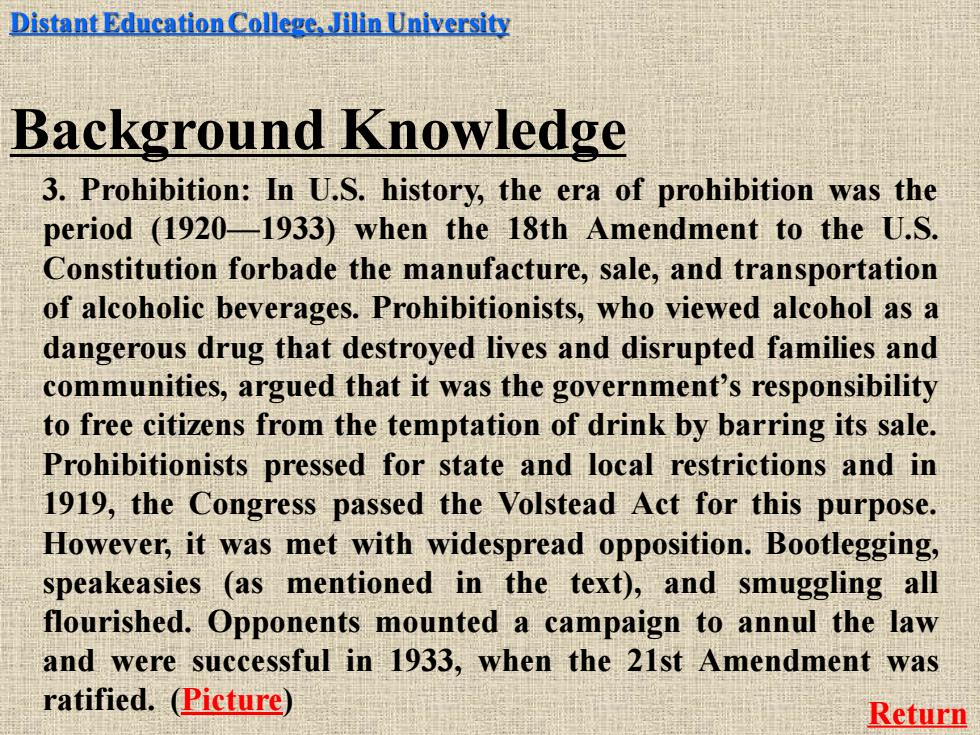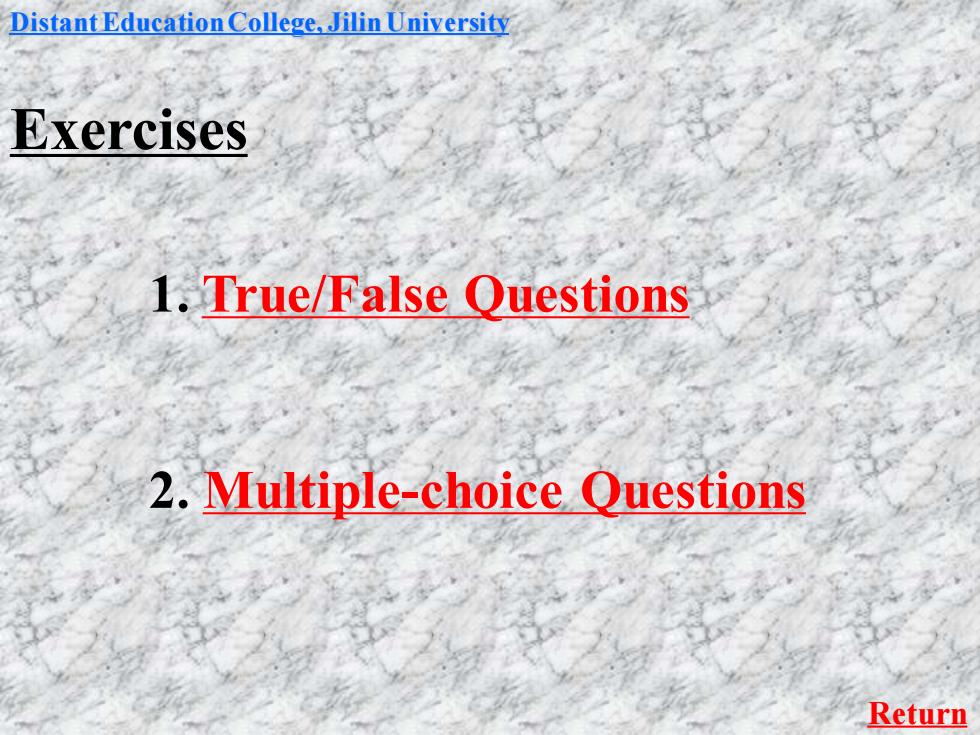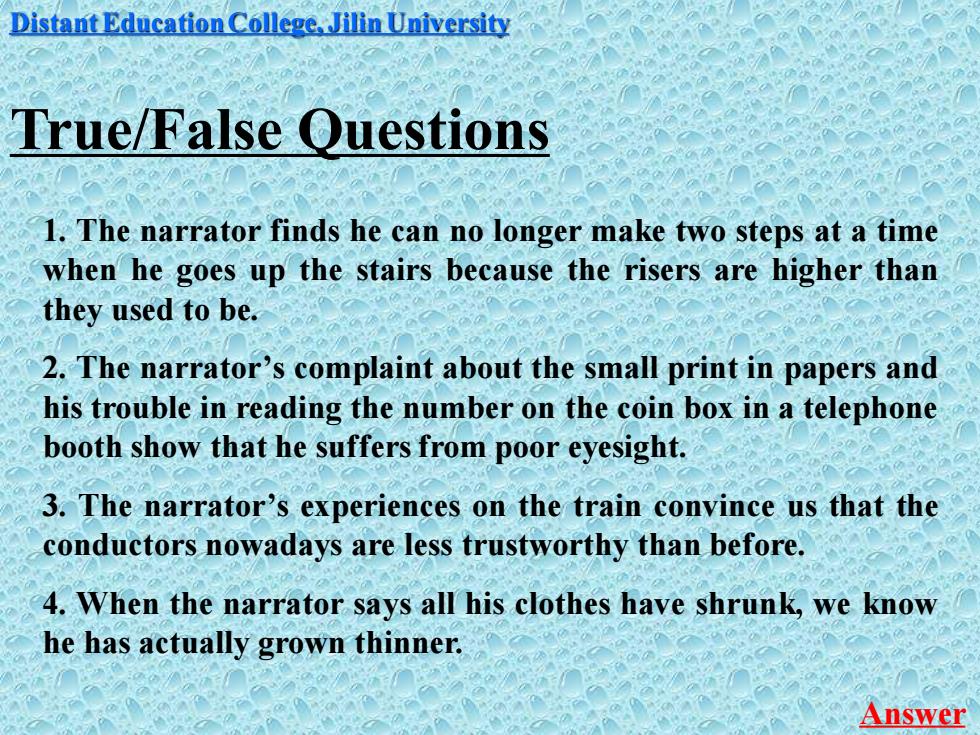
Distant Education College,Jilin University Background Knowledge Should one be able to say that enough has been done to keep a person alive,that no more operations or procedures should be done to prolong life for a month or a few months?Must one be kept alive indefinitely on life-support machines that function for the heart,lungs,or kidneys that no longer work themselves? Should old people with failing hearts be given heart transplant? Should medicines be used that have undesirable side effects so that life is prolonged but is filled with pain?These ethical questions are new,since the medical technology is itself quite new. More
Should one be able to say that enough has been done to keep a person alive, that no more operations or procedures should be done to prolong life for a month or a few months? Must one be kept alive indefinitely on life-support machines that function for the heart, lungs, or kidneys that no longer work themselves? Should old people with failing hearts be given heart transplant? Should medicines be used that have undesirable side effects so that life is prolonged but is filled with pain? These ethical questions are new, since the medical technology is itself quite new. Background Knowledge Distant Education College, Jilin University More

Distant Education College,Jilin University Background Knowledge 3.Prohibition:In U.S.history,the era of prohibition was the period (1920-1933)when the 18th Amendment to the U.S. Constitution forbade the manufacture,sale,and transportation of alcoholic beverages.Prohibitionists,who viewed alcohol as a dangerous drug that destroyed lives and disrupted families and communities,argued that it was the government's responsibility to free citizens from the temptation of drink by barring its sale. Prohibitionists pressed for state and local restrictions and in 1919,the Congress passed the Volstead Act for this purpose. However,it was met with widespread opposition.Bootlegging, speakeasies (as mentioned in the text),and smuggling all flourished.Opponents mounted a campaign to annul the law and were successful in 1933,when the 21st Amendment was ratified.(Picture) Return
3. Prohibition: In U.S. history, the era of prohibition was the period (1920—1933) when the 18th Amendment to the U.S. Constitution forbade the manufacture, sale, and transportation of alcoholic beverages. Prohibitionists, who viewed alcohol as a dangerous drug that destroyed lives and disrupted families and communities, argued that it was the government’s responsibility to free citizens from the temptation of drink by barring its sale. Prohibitionists pressed for state and local restrictions and in 1919, the Congress passed the Volstead Act for this purpose. However, it was met with widespread opposition. Bootlegging, speakeasies (as mentioned in the text), and smuggling all flourished. Opponents mounted a campaign to annul the law and were successful in 1933, when the 21st Amendment was ratified. (Picture) Background Knowledge Distant Education College, Jilin University Return

Distant Education College,Jilin University Questions for Discussion 1.Were you ever bewildered by the adult world when you were in your childhood? 2.As you grow up,do you notice any difference between how you used to understand things and how you do now? Return
1. Were you ever bewildered by the adult world when you were in your childhood? 2. As you grow up, do you notice any difference between how you used to understand things and how you do now? Questions for Discussion Distant Education College, Jilin University Return

Distant Education College,Jilin University Exercises 1.True/False Questions 2.Multiple-choice Questions Return
1. True/False Questions 2. Multiple-choice Questions Exercises Distant Education College, Jilin University Return

Distant Education College,Jilin University True/False Questions 1.The narrator finds he can no longer make two steps at a time when he goes up the stairs because the risers are higher than they used to be. 2.The narrator's complaint about the small print in papers and his trouble in reading the number on the coin box in a telephone booth show that he suffers from poor eyesight. 3.The narrator's experiences on the train convince us that the conductors nowadays are less trustworthy than before. 4.When the narrator says all his clothes have shrunk,we know he has actually grown thinner. Answer
1. The narrator finds he can no longer make two steps at a time when he goes up the stairs because the risers are higher than they used to be. 2. The narrator’s complaint about the small print in papers and his trouble in reading the number on the coin box in a telephone booth show that he suffersfrom poor eyesight. 3. The narrator’s experiences on the train convince us that the conductors nowadays are less trustworthy than before. 4. When the narrator says all his clothes have shrunk, we know he has actually grown thinner. True/False Questions Distant Education College, Jilin University Answer